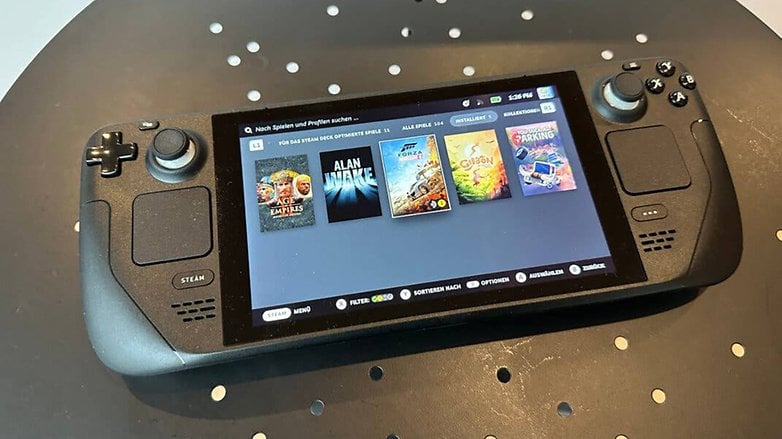
The Steam Deck emerged as a surprise hit this year, with demand far exceeding expectations. It took longer for me to receive this tech gadget than any other I’ve ever waited for. Naturally, my excitement was unparalleled when I finally got to hold the handheld console for the first time.
Now, three months have passed, during which I’ve had the chance to dive into numerous games. Has the initial enthusiasm endured? It’s time to share our findings.
Steam Deck in a nutshell
The American company Valve is behind the Steam Deck. It is known in particular for its Steam gaming platform. With the “Index” and the “Vive”, however, they also offer VR glasses. The Steam Deck is the manufacturer’s first handheld console.
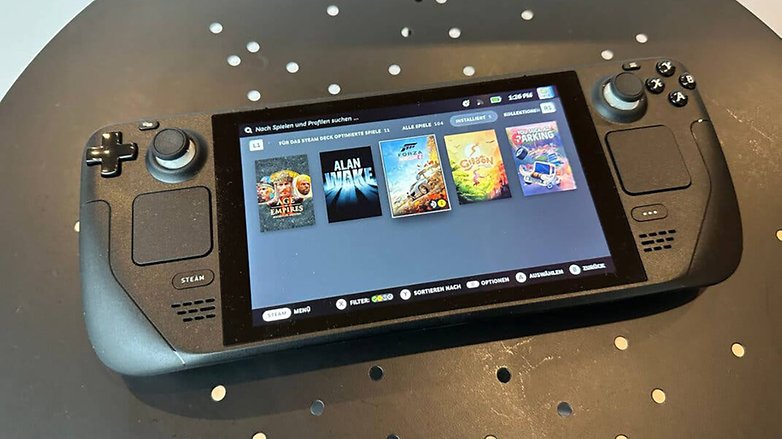
The Steam Deck can be imagined as a larger Nintendo Switch. It weighs 669 grams and has a 7-inch touchscreen. To be compatible with as many games as possible, in addition to the usual controller buttons, analog sticks and triggers, two trackpads for control with a mouse pointer and a gyroscope for motion control are also installed.
The performance of the handheld console is based on a quad-core processor developed in partnership with AMD. This is equipped with 16 GB of RAM and, like the current Xbox Series S/X, relies on an RDNA2 architecture.
The software used is the self-developed SteamOS based on Linux. However, Valve also provides drivers for Windows, so it is possible to make the switch. However, I never felt the need to install Windows, as all my games run smoothly on SteamOS thanks to the pre-installed Windows emulator.
Long-Term Review of the Steam Deck
Hardware
The plastic housing of the Steam Deck is perfectly finished and makes a robust impression. With a weight of 669 grams, the handheld is about twice as heavy as a Switch, but this makes no difference when gaming for long periods.
Both devices are “too heavy” to hold in your hand for long periods, so you have to prop them up on your lap or a table. The only noticeable disadvantage is during transportation. The case is at least twice as thick and takes up quite a lot of space in your rucksack.
I think the arrangement of the buttons is very successful. The directional pad, buttons, and analog sticks can be operated ergonomically even during longer gaming sessions. The trackpad and shoulder buttons are also easy to reach. The feel and precision of the Steam Deck are also at a very high level. The inputs are precise, and the haptic feedback of the controllers and trackpads feels high-quality and direct.
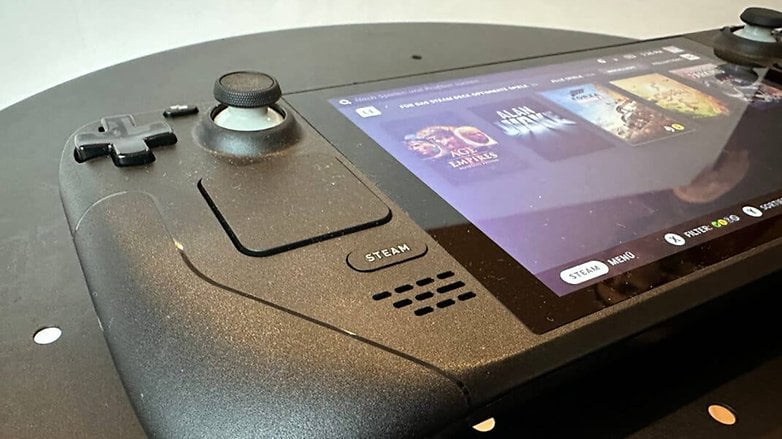
Display
The 7-inch screen of the Steam Deck has a resolution of 1,280 x 800 pixels, i.e. 720p. There have been many calls for a higher Full HD resolution. However, I have never found the resolution to be a problem. The Switch also comes with a 720p display, which is perfectly adequate for this size and distance from the eyes.
For a potential successor, I would prefer a higher refresh rate than 60 Hertz or thinner display edges. In addition, many games have thin, black bars at the top and bottom of the screen due to the unusual 16:10 format and do not utilize the entire screen.
The IPS panel impresses with its realistic color reproduction and good viewing angles. The brightness of 400 nits is perfectly adequate for gaming on the sofa, in the bed, or on the train or plane. Only while you are on a sunny terrace or on the beach would you need a higher brightness. An ambient light sensor reliably controls the brightness automatically so that I never had to adjust it manually in the Steam Deck review.

Performance
The Steam Deck stands out as a potent handheld console, boasting a graphics performance of 1.6 teraflops. For comparison, the Xbox Series S, capable of 120 Hz at 1440p, delivers 4 teraflops, while the latest Nintendo Switch model, supporting 60 Hz at 720p, achieves just 0.4 teraflops.
Together with a powerful AMD processor with 4 cores and 16 GB of RAM, the Steam Deck has enough performance to smoothly display even the latest triple-A titles in 720p and high graphics settings. I spent a particularly long time playing Forza Horizon 4 and 5, both of which run smoothly at the highest settings, even though they are not officially supported by the Steam Deck but are marked as playable.
Games and compatibility
Even though it is certainly Valve’s long-term goal, not every game from the Steam store currently works on the Steam Deck. To provide clarity for all users and interested parties, Valve has introduced four categories of compatibility in which all games are sorted:
- Verified: These games run fully on the Steam Deck.
- Playable: Games basically work, but may require a few adjustments to the settings or controller layout.
- Unsupported: These games do not work at the moment.
- Unknown: These games have not yet been checked.
You can find out how many of your games are supported in the Steam application before you buy them. Games that can also be played on a computer or console with a controller usually work perfectly. In Forza Horizon 4, for example, only the text in the game is too small in some places, as the game has been optimized for larger screens.
Games that are not supported often require a mouse and keyboard and cannot be operated with a controller on the computer. Often, however, they can still be played.
Take Age of Empires 2 DE, for example: The game is marked as “unsupported”, but starts without any problems on the Steam Deck, although it is tricky to control with the two trackpads and online tournaments are not possible. However, if you connect the Steam Deck to a dock, the game runs smoothly.
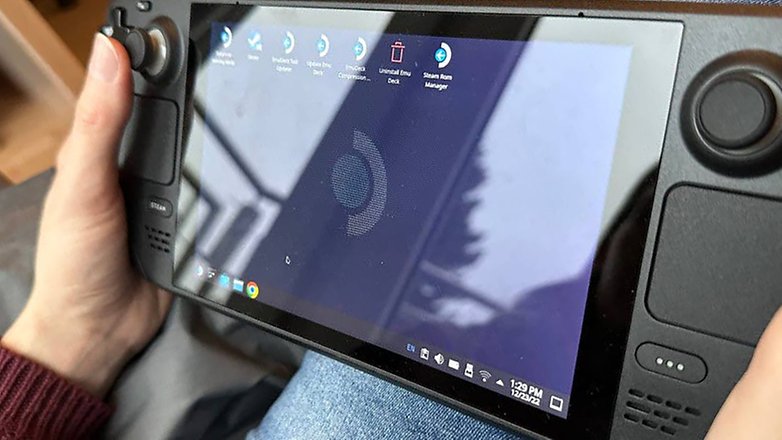
Steam Deck Dock
With a dock, you can connect a monitor, keyboard and mouse, or controller to the handheld and play at your desk or on the TV. In addition to the official Steam Deck dock, other USB-C docks also work flawlessly. I connected the Steam Deck to my Anker Thunderbolt dock, which is usually connected to my MacBook for work. The Steam Deck immediately established a connection to the monitor.
In this way, you can also play on a large screen with the Steam Deck. Depending on the resolution, however, there are performance limitations with current triple-A titles.
Memory
Depending on the variant selected, the Steam Deck is available with 64, 256, or 512 GB of storage space. We tested the medium variant. Depending on which games you want to play, the internal memory is quickly used up. Our 256 GB was just enough to install two triple-A titles such as Forza Horizon 4 and 5.
Fortunately, all variants are equipped with a microSD slot. This allows games to be swapped to a memory card of any size. We did not notice any differences in gaming speed.
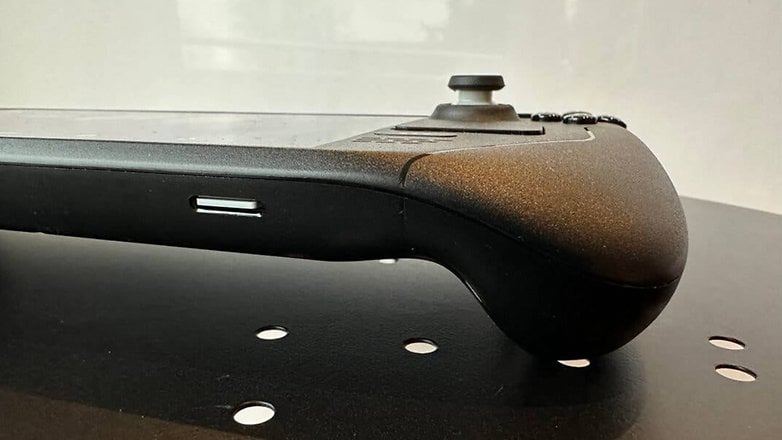
Battery life
The battery life is heavily dependent on which games you play. With performance-hungry games such as Forza Horizon 5, the battery is empty after around 120 minutes. With small indie games, however, the Steam Deck easily lasts six hours or more. Charging is via USB-C with 45 watts. A corresponding power supply unit is included.
However, Valve relies on the open PD standard, which means that any commercially available power supply or power bank can be used for charging. The USB-C port on the Steam Deck is located at the top so that it does not interfere with charging the handheld while gaming.
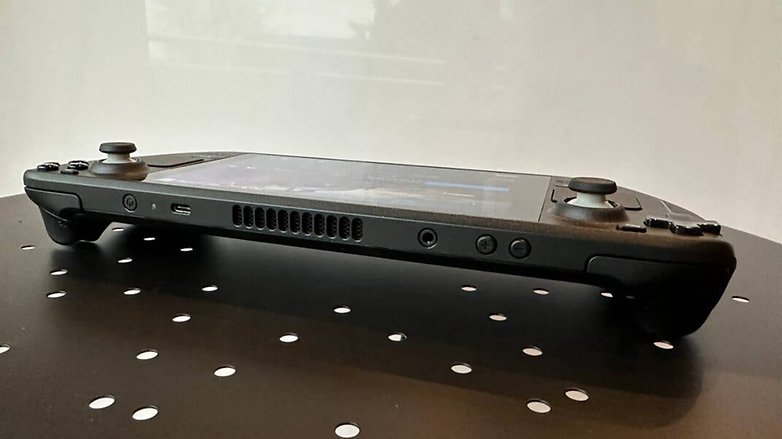
Is the Steam Deck the Best Console in the World?
The past three months with the Steam Deck have been a lot of fun. The hardware is convincing in the long-term test, and the selection of games is great. As a PC and Xbox gamer, I have always wished for a portable console like the PS Vita or Switch to play my games on the go—with the Steam Deck, this has now become a reality.
Of course, you can also take a gaming notebook with you when traveling, but a handheld is much more compact and better suited for gaming in bed, on the sofa and when traveling. Thanks to the direct connection to Steam and the certification system, downloading new games is effortless.
As long as you are in console mode, the Steam Deck is a great and more versatile alternative to the Switch. In desktop mode, however, you notice that the software is not yet 100 percent mature. However, the Steam Deck receives regular updates and is constantly being improved.
However, Valve’s open approach to the Steam Deck cannot be emphasized positively enough. It is no problem at all to download games from other platforms and websites—so you are by no means tied to the Steam platform. There are also countless emulators for playing games from other platforms on the Steam Deck.
The Steam Deck is also exemplary when it comes to repairs: only standard Phillips screws are used and nothing is glued. This means that highly used parts such as the analog sticks can be replaced with little effort. Valve provides inexpensive spare parts and illustrated repair instructions on iFixit.
With a $437 price tag for the smallest storage version, the Steam Deck is comparatively inexpensive. 256 GB will cost $478, while 512 GB will set you back by $534. The latter also has an anti-glare display.






